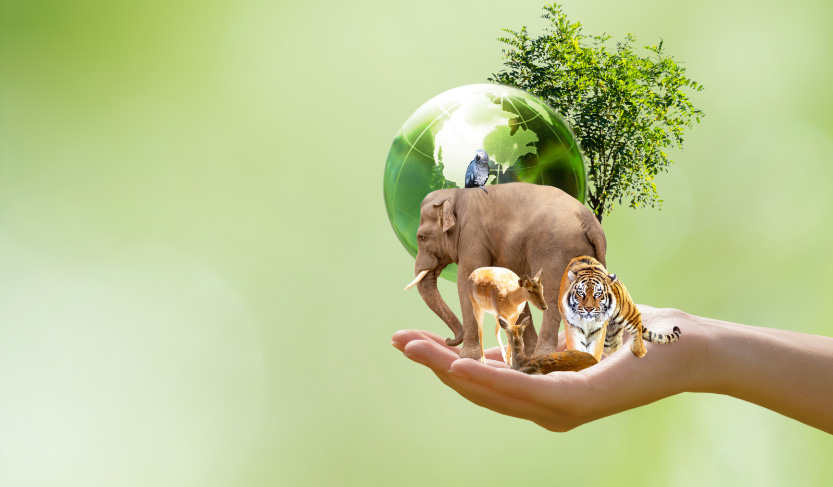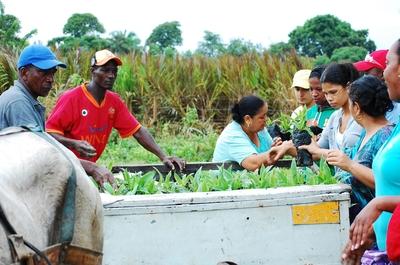
Biodiversity, Concept, Crisis, and Effects
“Know that the order and perfection of the universe require that existence should appear in countless forms.... There must be differences of degrees and stations, of kinds and species, for existence to shine forth with the utmost perfection.”

The Earth is only one of the planets in the solar system, and the solar system itself is one of the millions of systems in the Milky Way galaxy which is just one of about 2 trillion galaxies in the universe.
The Earth holds 8.7 million species of creatures, each of which plays a special role in this infinity. This amount of variety, accuracy, and order is one of the wonders of this world. We unknowingly started destroying the Environment and its unique diversity. The reduction of biodiversity has many harmful effects on humans and the surrounding environment, which will be irreparable if not stopped as soon as possible.
Biodiversity Definition
Biological diversity or biodiversity is the degree of variation of life, including all types of genes, species, ecosystems, and ecological processes. All kinds of plants, animals, fungi, and microorganisms present biodiversity in a place. A biodiverse region is an area with many different species and not a large population of a few species. Sites such as tropical rainforests are biodiverse as they have millions of different species. Other areas, like deserts and mountains, have far fewer species and are less biodiverse.

By quick research, Colombia has the most bird species worldwide and, with more than 24,000 vascular plant species after Brazil and Indonesia, is the 3rd most biodiverse country on the Earth.
Biodiversity Hotspots
An area must meet two criteria to be entitled as a biodiversity hotspot:
It must have at least 1,500 vascular plants as endemics and a high percentage of plant life that cannot be found anywhere else on the planet. As such, these spots are rich in life and contain a diverse number of species. In fact, these places benefit people the most and are part of the wealthiest and most influential global ecosystems.
It should have only 30% or less of its natural vegetation. In other words, it must be threatened and at high risk of destruction by humans. In fact, hotspots are home to many vulnerable populations that are directly dependent on nature for their survival.
The spots introduced above make up about 2.3% of the Earth's surface, but 44% of the world's plants and 35% of terrestrial vertebrates live in these areas, and most of the plants in these areas are endemic, meaning they are not found anywhere else on earth.
According to Conservation International, 36 regions are known as biodiversity hot spots in the world, the most important of which is the Tropical Andes.
Biodiversity Loss Crisis
Since the entire ecosystem is interconnected, the reduction and destruction of one part affects the whole system. With the destruction of forests, the biodiversity of species living in and dependent on them is lost, and losing species would negatively affect the balance of our world. In some cases, the loss of even one essential species (such as bees) will upset the balance of the world. Research on the OECD library website illustrates that the average worldwide abundance of the species population has decreased by 44% since 1970.

Biodiversity is greater in the tropics; for instance, the Amazon Forest is home to 2,500 species of trees that contain more than 3 million living species. According to the Red list IUCN Endangered Species, more than 41,000 species are threatened with extinction, which is still 28% of all assessed species. Endangered species on land are Amphibians 41%, Mammals 27%, Conifers 34%, Birds 13%, Reptiles 21%, and Cycads 69%, and this is apart from the species that are in the sea.
Effects of Biodiversity Loss
All organisms of biodiversity, including plants, animals, protists, and fungi, are vital, even insects and bacteria that cannot be seen. Since the entire ecosystem is related to each other, it is worth noting that biodiversity is critical for safeguarding global food security, underpinning healthy and nutritious diets, improving rural livelihoods, and enhancing the resilience of people and communities.
Many studies present the importance of preserving biodiversity. A few examples of such studies are:
A review article published in Nature Journal in 2012 represents that biodiversity loss reduces the efficiency by which ecological communities capture biologically essential resources (nutrients, water, light, prey), produce biomass, decompose, and recycle biologically essential nutrients.
There is increasing evidence that biodiversity increases the stability of the ecosystem (primary production, nutrient cycling, and decomposition) over time, and its loss naturally disrupts ecosystem functioning.
The reduction of biodiversity for which deforestation is the leading cause, - and the effects it can have on the entire global climate system increase the spread of epidemic and infectious diseases, especially common diseases of humans and animals. About 60% human infections are of animal origin. According to the World Health Organization, the adverse effects of Biodiversity loss on health far outweigh the risks to human health from climate change.
Altogether…
Biodiversity loss is an international crisis that puts many species and ecosystems in danger. Many human actions, such as deforestation, overexploitation, global warming, pollution, and the introduction of alien species, are to blame for this loss. In the following blog, we'll delve more deeply into the reasons for its loss and look at feasible steps that people, businesses, and governments can take to protect and restore the rich biodiversity of the earth.
Read Our Insightful Blog Posts

Top 8 Innovations Shaping Our Green Future
Stay ahead with the latest sustainable innovations transforming our world. Explore cutting-edge technologies and solutions shaping a greener future.

Agroforestry: Revolutionizing Farming, Empowering Farmers, and Protecting the Planet
Discover the benefits of agroforestry, a sustainable solution that supports farmers and environmental protection.

The Joy of Giving: Unveiling the Neuroscientific Reasons Behind Charitable Donations
Uncover the neuroscience behind charitable giving and discover how acts of generosity can significantly uplift your mood, enhance social bonds, and contribute to a more fulfilling life.
Green Your Inbox!
With our Newsletters, Stay updated on our Stories of Change and Growth.
As a gift, get a personalised Nature E-card from PH.

